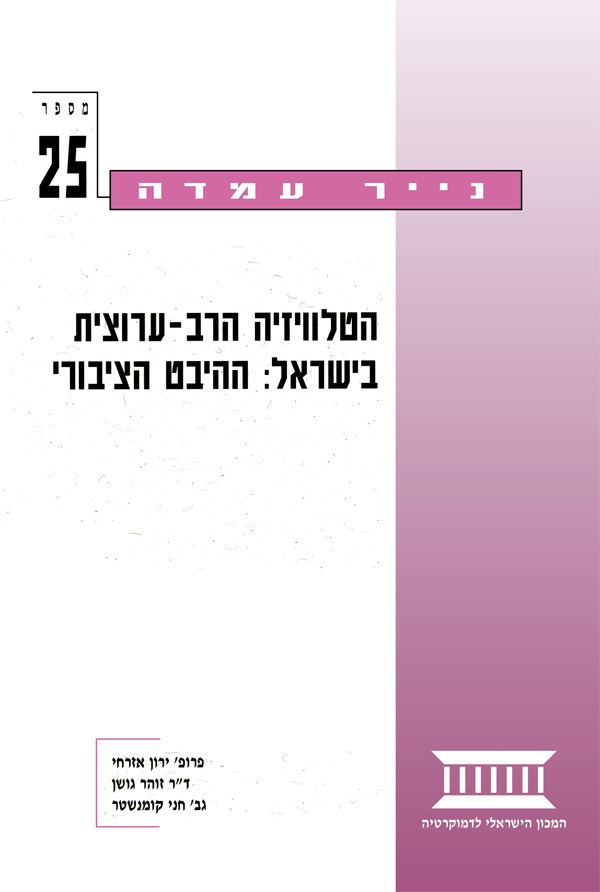Multi-Channel Television in Israel: The Public Aspect
Policy Paper No. 25
- Written By: Yaron Ezrahi, Zohar Goshen, Hanny Comaneshter
- Publication Date:
- Cover Type: Softcover
- Number Of Pages: 56 Pages
- Center: Media Reform
- Price: 45 NIS
A policy paper that explores the question of how can we safeguard the interests of the public - and not only those of the television channels and the bodies that finance them - in an era of multichannel television?
This position paper opens by presenting the background for a discussion of the TV market as it is today and as it should be in the future. Next, the central elements needed for the development and advancement of competition are presented: cable versus satellite; separation of content from carrier; multiplication of competitors; the influence of competition on content; technological advances and public oversight; concentration and cross-ownership; the status of public broadcasting; development and encouragement of local programming; and the cultural profile of the Israeli TV screen. The paper ends with a summary and list of recommendations.
The Israel Democracy Institute attributes great importance to the public aspect of the shape and organization of Israel’s multi-channel television map. Political, cultural and social life in Israel are influenced, and have been influenced for many years, by the decisions that set the operating terms for Israel’s TV channels. These decisions determine the development of patterns of competition in this communications market; the guidelines for public oversight and the authority placed in the hands of the supervising institutions; the choices that form the range of incentives that motivate the behavior of the network franchisees and the producers and programming directors at the various channels; and of course the behavior of the viewing public.
It is true that the laws that governing Israel’s electronic media generally express worthy public values and needs. However, it is possible to identify a clearly developing gap between the standards set by law and their actual application by the television franchisees. In the area of implementation, economic and political interests exert unceasing pressure, both visible and hidden, on ministers, civil servants and public representatives responsible for carrying out oversight.
Under these circumstances, a special effort must be made by independent bodies to help the unorganized viewing public to identify and define its interest, to represent it, and to support the representatives of the public and those who work on its behalf in defending the public interest in the multi-channel TV arena. By this we mean both the interest of the individual viewer and the collective interest of the various communities of viewers, as well as the interest of the public at large.
This position paper takes a synoptic perspective on the various components of the public interest in the multi-channel television system in Israel. In our opinion, each decision or move that can affect the structure of the multi-channel television system must be examined first and foremost for its influence on the following factors:
- Viewer’s range of choice of channel packages in order to optimize the fit between the viewer’s pocket and his preferences
- The status and accessibility of public channels within the framework of the multi-channel system
- The production and the free flow of reliable information about the political, social and economic reality and the proliferation of high-level, varied commentary concerning developments within that reality
- Maintenance of conditions of competition and funding that promise diverse and high-quality programming on the system seen as a whole
- Viewers’ influence on the menu of programming, including an appropriate mix of locally-produced and acquired programs, documentaries and entertainment shows
- Reducing or eliminating the problem of cross-ownership in the Israeli media.
Since not every kind of competition has an outcome commensurate with the public interest, the democratic process and individual freedoms, it is preferable to opt for a mix of competition and professional regulation that will result in a worthy balance between these values and the legitimate economic interests of the players in the communications market.
- Tags:
- regulation,
- Media Reform

